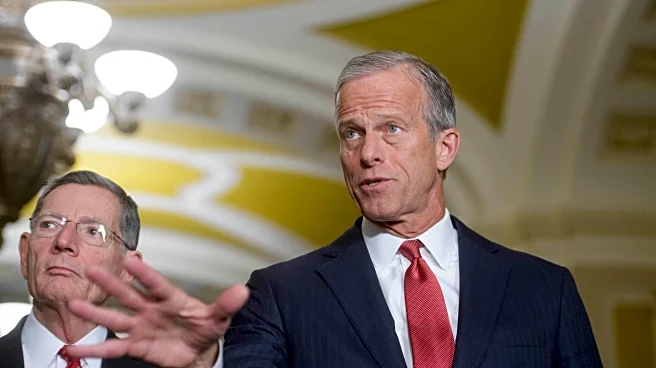What's Happening?
Prime Minister Benjamin Netanyahu has embarked on a diplomatic visit to the United States, where he is scheduled to address the United Nations General Assembly in New York and meet with President Donald Trump at the White House. This visit marks a significant moment as Netanyahu's government plane, 'Wings of Zion,' altered its usual flight path to avoid European airspace, extending the journey by over 600 kilometers. The visit comes amid ongoing tensions in the Middle East, including recent conflicts in Gaza and the West Bank. Netanyahu's agenda is expected to focus on regional security issues and strengthening bilateral relations with the U.S.
Why It's Important?
Netanyahu's visit to the U.S. is crucial for several reasons. It underscores the strategic alliance between Israel and the United States, particularly in addressing Middle Eastern conflicts and security concerns. The meeting with President Trump is likely to reinforce diplomatic ties and discuss mutual interests, including defense cooperation and regional stability. This visit also comes at a time when Israel is facing international scrutiny over its actions in Gaza, making Netanyahu's speech at the UN an opportunity to address global leaders and potentially influence international opinion. The altered flight path signifies geopolitical tensions and the complexities of international diplomacy.
What's Next?
Following the UN speech and White House meeting, Netanyahu is expected to engage in further diplomatic discussions with U.S. officials. The outcomes of these meetings could impact future U.S.-Israel relations, particularly in terms of military aid and strategic partnerships. Additionally, Netanyahu's address at the UN may prompt reactions from other international leaders, influencing global discourse on Middle Eastern politics. Observers will be watching for any announcements regarding new initiatives or agreements between the two nations.
Beyond the Headlines
Netanyahu's visit highlights the broader geopolitical dynamics at play, including Israel's positioning in international politics and its relationship with neighboring countries. The decision to avoid European airspace reflects ongoing diplomatic challenges and the need for strategic navigation in international relations. This visit may also have implications for domestic politics in Israel, as Netanyahu seeks to bolster his leadership amid regional conflicts and international criticism.











